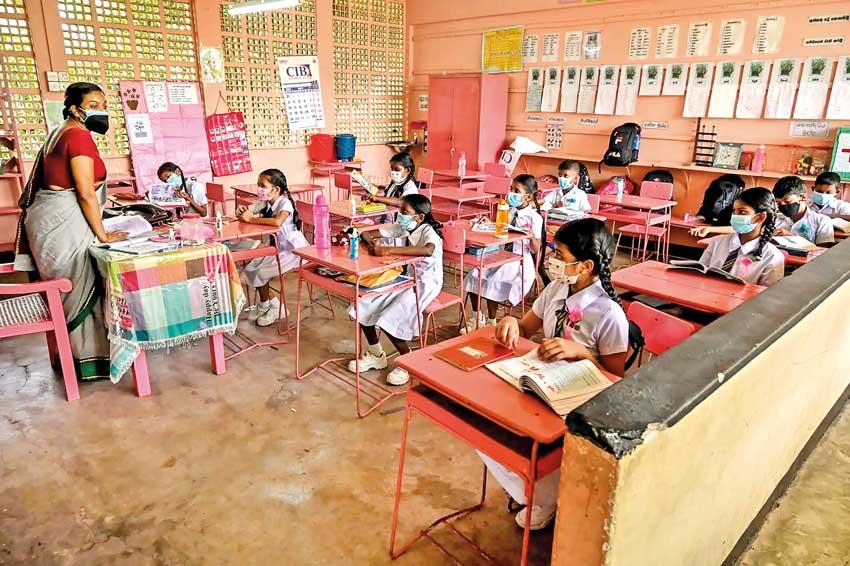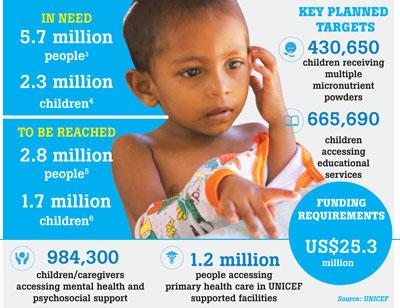29 Dec 2022 - {{hitsCtrl.values.hits}}

He’s ditching classes and his memory is failing without a balanced nutrition. His marks have also gone down and I feel utterly helpless every day, knowing that I’m failing my duty as a parent
For many children from poor families, a school meal could be the only proper meal they eat in a day
UNICEF representatives noted that Sri Lanka has the second-highest rate of acute malnutrition among children under 5 in South Asia and at least 17 per cent of children are suffering from chronic wasting
UNICEF noted that school attendance rates have dramatically fallen with the effects of the economic crisis and are likely to fall further
 With the grip of the unprecedented economic crisis in the country, government funding for free school lunches was cut as food prices skyrocketed. Many schools thus stopped serving meals due to the surging cost of basic food items, leaving families struggling to feed their children amidst a backdrop of food price hikes and nationwide rations on basic goods.
With the grip of the unprecedented economic crisis in the country, government funding for free school lunches was cut as food prices skyrocketed. Many schools thus stopped serving meals due to the surging cost of basic food items, leaving families struggling to feed their children amidst a backdrop of food price hikes and nationwide rations on basic goods.
According to the World Bank collection of development indicators, which monitors nutritional and health status in populations, child malnutrition in Sri Lanka was reported at a “1” in 2020. A UNICEF report shows that more than 5.7 million people, including 2.3 million children in Sri Lanka require humanitarian assistance. This report also highlighted that Sri Lanka is in the top 10 countries with the highest number of malnourished children and that the numbers are expected to rise further as well.
UNICEF representatives also noted that Sri Lanka has the second-highest rate of acute malnutrition among children under 5 in South Asia and at least 17 per cent of children are suffering from chronic wasting, a disease that carries the highest risk of death.
 A father from a low-income family from Kohalwila said that his child is having health complications due to malnutrition and that it’s affecting his studies massively. He believes that a good education is his son’s only way out of poverty. Therefore his son’s declining health and hesitation to continue his studies is alarming and painful for him to witness. “He’s ditching classes and his memory is failing without a balanced nutrition. His marks have also gone down and I feel utterly helpless every day, knowing that I’m failing my duty as a parent,” he said.
A father from a low-income family from Kohalwila said that his child is having health complications due to malnutrition and that it’s affecting his studies massively. He believes that a good education is his son’s only way out of poverty. Therefore his son’s declining health and hesitation to continue his studies is alarming and painful for him to witness. “He’s ditching classes and his memory is failing without a balanced nutrition. His marks have also gone down and I feel utterly helpless every day, knowing that I’m failing my duty as a parent,” he said.
A UNICEF report shows that more than 5.7 million people, including 2.3 million children in Sri Lanka require humanitarian assistance
Are school lunches challenged?
Children in Sri Lanka are disproportionately affected by the unfolding economic crisis according to UNICEF reports and the halted distribution of free supplementary food for malnourished children and the faltering provision of nutritious school meals would likely result in more children suffering from
acute malnutrition.
Schools in Sri Lanka that are still serving meals have had to significantly cut back on the size and protein density of the food. Before the crisis, a typical school meal consisted of a balanced diet of meat or eggs, rice, fruit and vegetables. Now, children are receiving meals consisting mainly of carbohydrates and facing an imminent malnutrition crisis with a looming protein deficit.
UNICEF further noted that school attendance rates have dramatically fallen with the effects of the economic crisis and are likely to fall further with the halt in school meals, which is often the only source of nutritious food for many marginalised children. In addition to this, Save the Children Foundation detected that more than half the schools have stopped serving meals due to the lack of government funding. Students have observed a noticeable fall in the richness of their diet and parents who depend on these school lunches for their children are expressing their concern and fear including teachers who observe that their students are getting weaker and inattentive every day.
A primary school teacher from Matara told the Daily Mirror that several of her students faint in the classroom and during their playtime and that it has become an extremely common situation now. “We have a system in our school where teachers put together funds with their own money and give meals to students every day”, she said. “This is helpful for many students and they benefit from it often because they haven’t had their breakfast or brought their lunch.” Another teacher from Gampaha said that the children now cannot even play during the break and some students have become severely anaemic too.
Extending school lunches for another million students
However, recently, the cabinet approved the proposal submitted by President Ranil Wickremesinghe for extending the school lunch programme to another million students apart from the 1.08 million students in 7,926 schools who were already benefiting from the programme. Usually this costs the government 12 million US dollars annually. Therefore, with a million more to feed, this would undoubtedly cause these costs to double and can become a challenging endeavour since the country is still hardly recovering from the economic crisis. However, child malnutrition in the country needs urgent action as well.
Save the Children Foundation is an organisation that works in collaboration with the Education and Health Ministry to provide these school lunches. Ranjan Weththasinghe from the organisation told the Daily Mirror that they are still continuing their usual school lunch programme that was already in operation before the economic crisis. They provide school meals for students in 850 schools by distributing commodities to complement the school meal programme.
He said that the difference in the usual school lunch programme was that previously, schools in districts like Colombo didn’t benefit from the programme as it only targeted and operated in rural areas where most of the underprivileged schools and communities were identified. Therefore the new extended programme is designed to target more urban areas as well.
Continuing the school lunch programme is vital for underprivileged children
Save the Children’s National Director, Julian Chellappah said that for many children from poor families, a school meal could be the only proper meal they eat in a day. “If we don’t keep the school meal programme going, we could soon see a situation where we aren’t just talking about hungry children but dangerously ill and malnourished children.”
He also stressed that it would be an absolute tragedy for education in Sri Lanka as well. Save the Children is distributing food to vulnerable families in eight districts of the country, to ensure children and their parents have access to nutritious meals despite the country’s economic crisis. Last year itself, the organisation provided school meals to more than 200,000 children.
“We didn’t halt our organisation’s lunch programme and continued providing school lunches to the districts we have chosen even amidst the economic crisis,” Weththasinghe mentioned. “Times are difficult, so we recognise that the decision taken by the government to extend their programme is admirable, even though the execution of it would be rather challenging.”
01 Nov 2024 45 minute ago
01 Nov 2024 1 hours ago
01 Nov 2024 2 hours ago
01 Nov 2024 2 hours ago
01 Nov 2024 2 hours ago